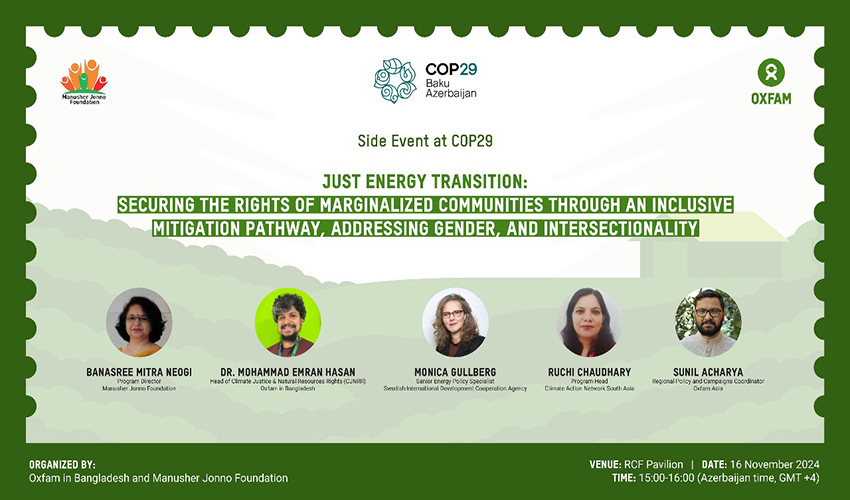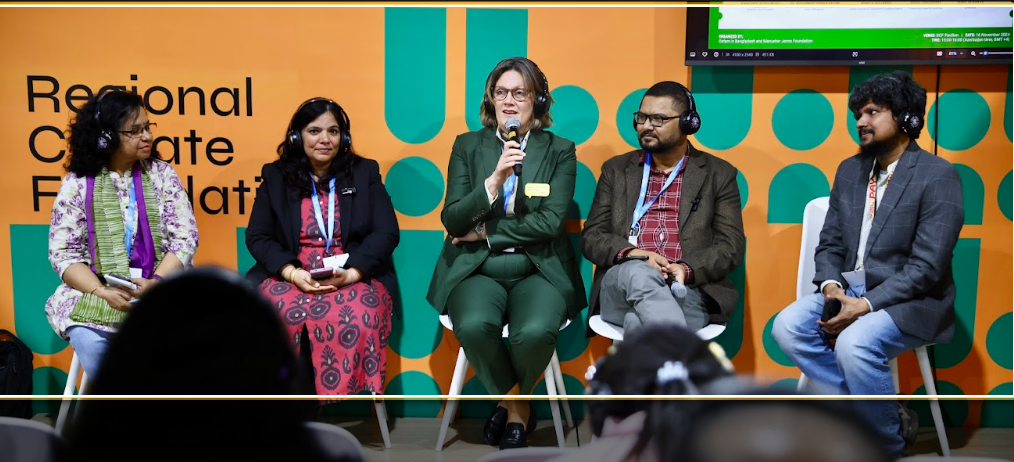Securing the Rights of Marginalized Communities through an Inclusive Mitigation Pathway, Addressing Gender and Intersectionality


World Bank research (2021) shows climate change has reduced vulnerable nations’ GDP by 20% since 2000. By 2030, it could force 132 million into poverty, mainly in South Asia and Sub-Saharan Africa. A just energy transition requires decarbonization, equitable funding, and support for affected communities. The ILO estimates a green economy could create 24 million jobs by 2030, but gender and intersectional equity are essential. UN Women (2022) highlights women’s disproportionate vulnerability to climate disasters. The event aimed to unite global leaders and grassroots voices to promote inclusive pathways and ensure marginalized groups benefit equitably.
The panellists included Sunil Acharya, Regional Policy and Campaigns Coordinator, Oxfam Asia, Dr. Mohammad Emran Hasan, Head of Climate Justice & Natural Resources Rights, Banasree Mitra Neogi, Program Director, Manusher Jonno Foundation, Ruchi Chaudhary, Program Manager, Climate Action Network South Asia, Monica Gullberg, Senior Energy Policy Specialist, Swedish International Development Cooperation Agency (SIDA).
The event was organized by Oxfam in Bangladesh, and Manusher Jonno Foundation.
Introduction
World Bank research (2021) shows climate change has reduced vulnerable nations’ GDP by 20% since 2000. By 2030, it could force 132 million into poverty, mainly in South Asia and Sub-Saharan Africa. A just energy transition requires decarbonization, equitable funding, and support for affected communities. The ILO estimates a green economy could create 24 million jobs by 2030, but gender and intersectional equity are essential. UN Women (2022) highlights women’s disproportionate vulnerability to climate disasters. The event aimed to unite global leaders and grassroots voices to promote inclusive pathways and ensure marginalized groups benefit equitably.
The panellists included Sunil Acharya, Regional Policy and Campaigns Coordinator, Oxfam Asia, Dr. Mohammad Emran Hasan, Head of Climate Justice & Natural Resources Rights, Banasree Mitra Neogi, Program Director, Manusher Jonno Foundation, Ruchi Chaudhary, Program Manager, Climate Action Network South Asia, Monica Gullberg, Senior Energy Policy Specialist, Swedish International Development Cooperation Agency (SIDA).
The event was organized by Oxfam in Bangladesh, and Manusher Jonno Foundation.
Background:
World Bank research from 2021 claims that since 2000, the GDP of some of the most vulnerable nations in the world has decreased by more than 20% due to climate change. A further indication of the pressing need for efficient climate finance channels is the UN’s estimate that by 2030, climate change might force an extra 132 million people into poverty, primarily in South Asia and Sub-Saharan Africa. Decarbonizing economies is necessary for a just energy transition, but it’s also important to make sure that everyone is treated fairly and that no one is left behind. The International Labor Organization (ILO) estimates that by 2030, the shift to a green economy might generate up to 24 million new jobs worldwide. To do this, significant funding for renewable energy sources, labor retraining, and strong social safety nets are needed, especially for residents of areas that depend heavily on fossil fuels.
Developed countries need to provide the lifesaving finance to lower income countries for climate action – renewables, efficient energy infrastructure, adaptation activities in various sectors, and just energy transition. There are opportunities to create an enabling environment for this financing. Innovative types of structured finance and out-come-based financial instruments to overcome some of the challenges will need to be deployed on a larger scale and improved where necessary. The side event proposed below delivers on the same.
Objective of Event:
The main goals will be to synthesize these lessons and promote stronger, more fair climate finance systems. Building on the momentum from COP 28, the side event at COP 29 will bring together world leaders, decision-makers, and grassroots voices to talk about practical steps that can be taken to secure the rights of marginalized groups through an inclusive mitigation approach. Given that the people most vulnerable to climate change are also the least accountable for it, this road must place a priority on including the marginalized voices, with gender and intersectional equity.
The side event will address diverse issues in private and public financing, the Accra-Marrakech Agenda, innovative financing models, and financing from Multilateral Development Banks. Loss and damage finance and finance from the perspective of Global stock take will be discussed.
Program Schedule
| Time of Activity | Facilitator/Team members | Description of Activity | Point of Discussion |
| 15.00-15.05 | Sunil Acharya, Regional Policy and Campaigns Coordinator, Oxfam GB | Welcome Speech, Setting the Voice, Introduction and Moderation | -Welcoming audience; Sharing the discussion agendas of the panel and introduction: Climate Inequality: disproportionate impacts of climate in global south; economic implications for the global south for JET, access to finance and jobs, inclusion of workers in green industries |
| 15.05-15.15 | Dr. Mohammad Emran Hasan, Head of Climate Justice & Natural Resources Rights | Key-note presentation | – On the need for energy transition policies that ensure equity and justice for both environmental and social goals (highlights justice angles from the pre-present-post energy generation phases.
-Accountability of the global north to south, climate finance commitments, transparency and accountability (finance, policy, technology; fashion industry as a polluter and its scenario for transition) |
| 15.15- 15.20 | Banasree Mitra Neogi, Program Director, Manusher Jonno Foundation | Panel discussant | – How can policy and finance in energy transition be directed to reduce gender-based barriers, especially for the female workers in RMG industry? |
| 15.20-15.25 | Sanjay Vashist, Director, Climate Action Network South Asia | Panel discussant | – What should be urgently addressed for a fast, fair, funded phase-out of fossil fuels, not only in low and middle income countries, but also how to divert investments in fossil fuels in polluting countries? |
| 15:25- 15:30 | Monica Gullberg, Senior Energy Policy Specialist, Swedish International Development Cooperation Agency (SIDA) | Panel discussant | – What prospects do you see for cooperation from the global north countries, what the development partners are prioritizing, and what is SIDA considering to support JET? |
| 15:30- 15:35 | Syeda Rizwana Hasan, Honorable Advisor, Ministry of Environment, Forest and Climate Change, Government of Bangladesh | Panel discussant | – What can the govt. of Bangladesh plan for decarbonization at door of new opportunities as a developing country? How can Bangladesh ensure public and private sector actors recognise, address and reduce the unequal, exploitative over consumption of commodities, such as the RMG, with negative impacts on climate, land, food security and natural resources rights? |
| 15.35-15:40 | Hilde Stroot, Policy Lead, Climate Justice Oxfam Novib | Panel discussant | – What can global humanitarian organizations do to facilitate this inclusive transition in the energy sector, from grassroots to global levels? |
| 15.40-15:55 | Sunil Acharya, Regional Policy and Campaigns Coordinator, Oxfam GB | Open discussion (10 mins) and Closing (5 mins) | – Question and Answer/Opinions from the audience and closing remarks from the panelists and moderator |




